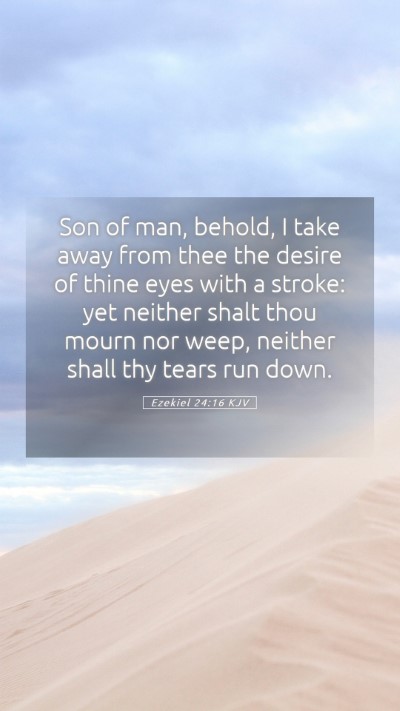Ezekiel 24:16 states, "Son of man, behold, I take away from thee the desire of thine eyes with a stroke: yet neither shalt thou mourn nor weep, neither shall thy tears run down."
This verse is one of the poignant moments in the Book of Ezekiel, reflecting profound loss and the prophet's role in conveying God's messages to a beleaguered nation. Here, the Lord instructs Ezekiel about the impending death of his wife, whom he cherishes deeply. This directive serves as a symbol reflecting God's judgment upon Jerusalem and the chastisement of His people.
Bible Verse Meanings and Interpretations
The verse signals two significant themes: the severity of God's judgments and the emotional restraint required of His prophets. The desire of Ezekiel's eyes represents the deepest emotional attachments, emphasizing the personal impact of national calamity.
-
God's Sovereignty: Matthew Henry points out that God retains the right to take away what is most precious to us. Ezekiel's personal loss is illustrative of the greater loss of Israel, reflecting the larger narrative of divine justice.
-
Prophetic Role: Albert Barnes emphasizes the responsibility of the prophets in communicating God's will while maintaining composure amidst personal tragedy.
-
Emotional Restraint: Adam Clarke elaborates on the instruction for Ezekiel to refrain from mourning, which underscores the gravity of the situation and the prophetic mandate to embody God's message rather than succumb to personal grief.
Insights from Public Domain Commentaries
Analysis by these commentators reveals layered meanings in the text:
- Judgment and Mercy: The text juxtaposes God's severe judgment with eventual restoration and mercy. It shows a serious warning to Israel about the consequences of their actions.
- Teaching Moments: The actions of Ezekiel serve a didactic purpose for the people of Israel, delivering a vivid lesson on the seriousness of spiritual disobedience.
- Personal and National Identity: The dead spouse represents the loss of Jerusalem. Just as Ezekiel was required to suppress his grief, the people were to understand the weight of their sins against God.
Understanding Scripture in Context
When seeking to understand the implications and applications of Ezekiel 24:16, it is crucial to explore its historical context. This passage occurs during a time of impending doom for Jerusalem, as the Babylonians are on the verge of capturing the city.
Application of Biblical Insights
For individuals or Bible study groups looking to apply this verse to their lives, consider the following:
- Recognizing Loss: Understanding that loss is a divine act and has a purpose can provide solace in difficult times.
- Submitting to God's Will: Reflect on your attachments and how they might reflect your relationship with God. Releasing earthly desires can lead to a more profound spiritual connection.
- Comfort in Responsibility: Just as Ezekiel was called to retain composure for a purpose, consider what responsibilities God may be calling you to fulfill, even amidst personal hardship.
Cross References
Ezekiel 24:16 relates to other scriptures that echo similar themes of loss, judgment, and prophetic duty:
- Jeremiah 9:1: Shares similar feelings of sorrow and mourning for the people of Israel.
- Isaiah 22:4: Addresses how prophetic figures deal with grief related to the fate of Jerusalem.
- Lamentations 1:16: Expresses deep sorrow for the destruction of Zion, which resonates with Ezekiel's message.


